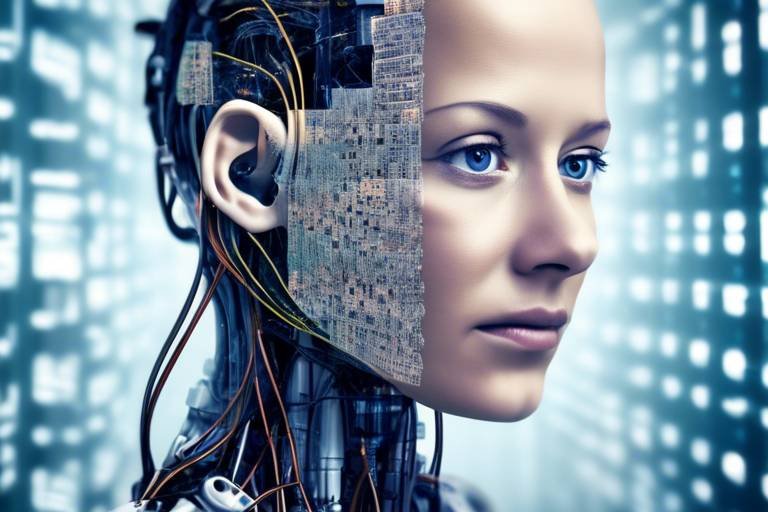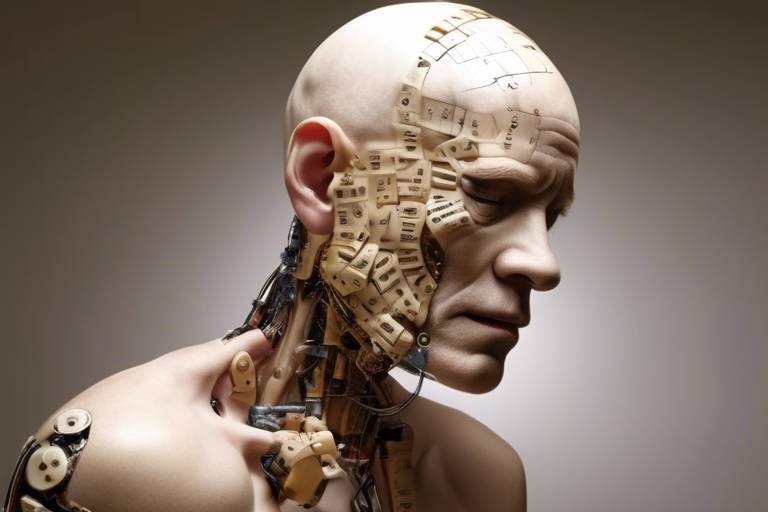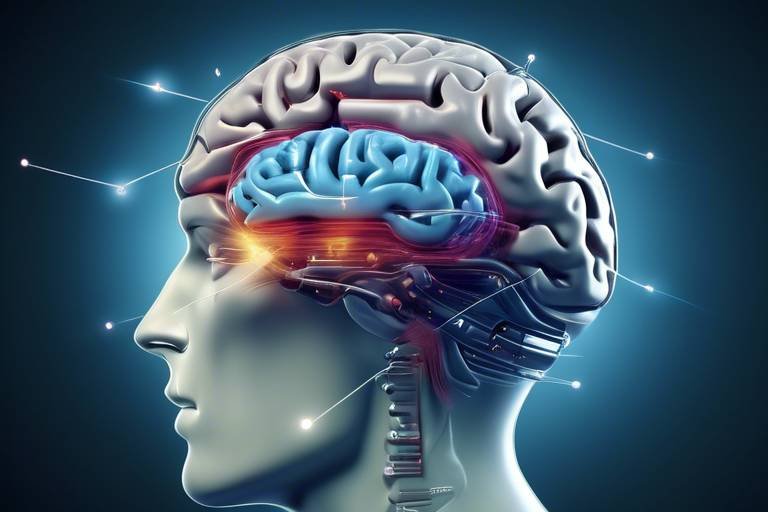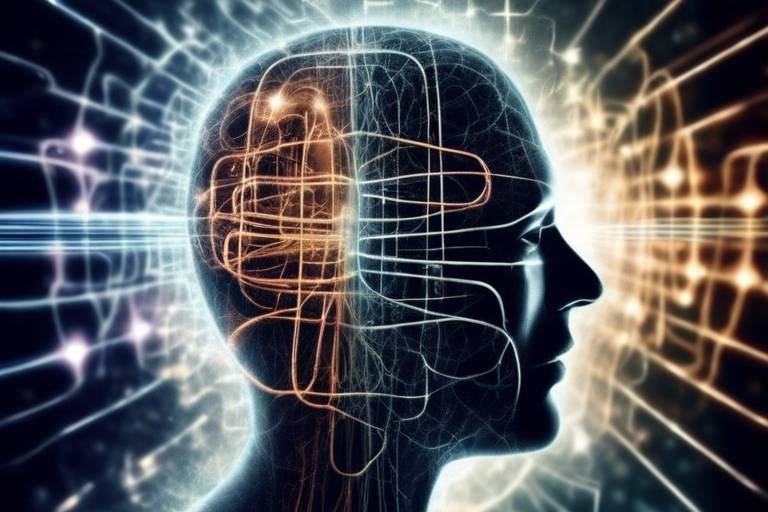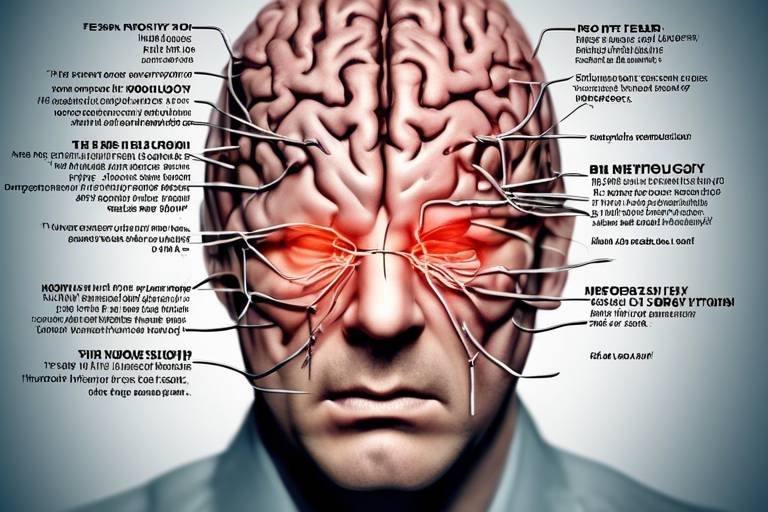The Debate on Human Consciousness and Morality
The intricate relationship between human consciousness and morality has sparked intense debates across various fields, including philosophy, psychology, and ethics. At its core, this discussion revolves around the question: What makes us moral beings? Is it our ability to think and reflect on our actions, or is it something deeper, perhaps innate within us? This article aims to navigate through the complex layers of consciousness and morality, shedding light on how these two essential aspects of human existence intertwine.
To understand this relationship, we must first delve into the nature of consciousness itself. Consciousness is often described as the state of being aware of and able to think about one's own existence, thoughts, and surroundings. Yet, defining consciousness is like trying to grasp smoke with your bare hands—elusive and multifaceted. Philosophers and scientists alike have proposed various theories to capture its essence, from the idea of consciousness as a stream of thoughts to the notion of it being a fundamental aspect of the universe. Each theory adds a layer of complexity to our understanding, making it evident that studying consciousness is no small feat.
As we explore the philosophical perspectives on morality, we encounter a myriad of theories that attempt to explain the foundations of moral behavior. Notable among these are utilitarianism, deontology, and virtue ethics. Each approach offers a unique lens through which to view moral dilemmas, and they are deeply intertwined with our conscious experiences. For instance, utilitarianism suggests that the best action is the one that maximizes happiness for the greatest number of people. But how does our consciousness influence our ability to assess outcomes and make such moral decisions? This question leads us down a rabbit hole of ethical considerations that challenge our understanding of right and wrong.
Moreover, the critiques of these philosophical theories reveal the limitations of a purely consequentialist approach to morality. For example, while utilitarianism emphasizes the importance of outcomes, it often overlooks the significance of intention and moral duty—elements that are deeply rooted in our conscious awareness. This interplay between consciousness and moral frameworks not only shapes our personal beliefs but also has profound implications for societal norms and ethical practices.
In the real world, the application of utilitarian principles can be seen in various domains, such as healthcare and environmental policy. Decision-makers often grapple with the challenge of balancing the greater good against individual rights and needs. Here, consciousness plays a pivotal role; our awareness of others' suffering and happiness can significantly influence the choices we make in these critical areas. Thus, understanding how consciousness impacts moral decision-making is essential for creating fair and just policies.
On the other hand, deontological ethics, which focuses on rules and duties rather than consequences, also highlights the importance of consciousness. This ethical framework posits that certain actions are inherently right or wrong, regardless of their outcomes. Our understanding of these moral obligations is shaped by our conscious reflection on the intentions behind our actions. This raises another intriguing question: How do our conscious experiences of empathy and moral reasoning develop over time?
Psychology offers valuable insights into this dynamic relationship between consciousness and morality. The development of moral reasoning is a lifelong process, evolving through various stages from childhood to adulthood. Children, for instance, may initially view morality in black-and-white terms, but as they grow, their understanding deepens, influenced by their conscious experiences and social interactions. This evolution underscores the idea that consciousness is not static; it's a vibrant, changing landscape that shapes our ethical perspectives.
Empathy, a crucial component of moral decision-making, also highlights the role of consciousness in our ethical choices. When we are consciously aware of others' feelings and experiences, we are more likely to make decisions that align with moral principles. This awareness fosters social cohesion and encourages ethical behavior, illustrating that our consciousness is not just a personal experience but a shared human trait that binds us together.
- What is consciousness? - Consciousness refers to the state of being aware of and able to think about one’s own existence, thoughts, and surroundings.
- How does consciousness relate to morality? - Consciousness influences our moral judgments and ethical behavior by shaping our understanding of right and wrong.
- What are the main philosophical theories of morality? - The main theories include utilitarianism, deontology, and virtue ethics, each providing different perspectives on moral behavior.
- How does empathy affect moral decision-making? - Empathy enhances our ability to make ethical choices by allowing us to understand and consider the feelings of others.

The Nature of Consciousness
Understanding consciousness is crucial to the debate on morality, as it serves as the foundation upon which our moral frameworks are built. But what exactly is consciousness? It’s a question that has puzzled philosophers, scientists, and psychologists alike for centuries. At its core, consciousness can be described as the state of being aware of and able to think about one’s own existence, thoughts, and surroundings. However, this definition barely scratches the surface of its complexity.
There are several theories that attempt to explain consciousness, each adding a unique perspective to this multifaceted phenomenon. For instance, the biological perspective suggests that consciousness arises from physical processes within the brain. This view posits that our thoughts and feelings are merely the byproducts of neural activity. On the other hand, philosophical theories often delve into existential questions, pondering whether consciousness is a fundamental aspect of the universe or simply an illusion created by our brains.
Moreover, the phenomenological approach emphasizes personal experience, suggesting that consciousness is deeply tied to our perceptions and emotions. This perspective highlights how subjective experiences shape our understanding of reality. For example, when we feel joy or sorrow, it’s our consciousness that allows us to reflect on these emotions and understand their implications.
It’s important to recognize that consciousness is not a binary state; it exists on a spectrum. Some individuals may experience heightened states of awareness, while others may find themselves in a more subdued state. This variability raises intriguing questions: How does this spectrum impact our moral judgments? Can a person’s level of consciousness influence their ethical behavior?
To further illustrate the complexity of consciousness, consider the following dimensions that contribute to its nature:
- Self-awareness: The ability to reflect on oneself and recognize one’s own thoughts and feelings.
- Intentionality: The capacity to direct thoughts towards something, whether it be an object, concept, or another person.
- Qualia: The subjective quality of experiences, such as the taste of chocolate or the color red, which are unique to each individual.
These dimensions not only enrich our understanding of consciousness but also highlight its intricate relationship with morality. For instance, self-awareness allows individuals to consider the consequences of their actions, fostering a sense of responsibility. Intentionality plays a crucial role in moral decision-making, as it shapes our motivations and the ethical implications of our choices. Meanwhile, the understanding of qualia can deepen our empathy towards others, enriching our moral fabric.
The challenges in studying consciousness are vast. Researchers grapple with defining it, measuring it, and understanding its origins. Despite advancements in neuroscience and psychology, consciousness remains one of the great mysteries of human existence. As we continue to explore this enigmatic aspect of our being, it becomes increasingly clear that our understanding of consciousness is not just an academic pursuit; it has profound implications for morality and ethical behavior in society.

Philosophical Perspectives on Morality
When we dive into the realm of morality, we find ourselves navigating a complex landscape shaped by various philosophical perspectives. These theories attempt to answer fundamental questions about what it means to be moral and how our consciousness plays a pivotal role in this process. At the heart of the matter, we encounter three major schools of thought: utilitarianism, deontology, and virtue ethics. Each of these frameworks offers a unique lens through which we can examine moral dilemmas and the conscious awareness that informs our decisions.
Utilitarianism, for instance, is often summarized by the phrase "the greatest good for the greatest number." This approach emphasizes the outcomes of our actions, suggesting that the morality of an act is determined by its consequences. Essentially, it challenges us to consider whether our choices will maximize happiness or minimize suffering. But how does consciousness fit into this picture? Our ability to foresee the potential outcomes of our actions relies heavily on our conscious thought processes. We weigh the benefits and drawbacks, often engaging in a mental calculus that can be both enlightening and paralyzing.
In the utilitarian framework, consciousness is not just a passive observer; it actively engages in evaluating the impact of our decisions. When faced with a moral dilemma, we often ask ourselves: "Will this choice lead to the best possible outcome for the most people?" This reflective process highlights the interplay between our conscious awareness and ethical decision-making. However, this approach is not without its critics.
Critics argue that utilitarianism can be overly simplistic. It reduces morality to a mere calculation of pleasure versus pain, which can lead to morally questionable outcomes. For instance, if a particular action results in the greatest happiness for the majority but causes significant harm to a minority, is it truly moral? This raises profound questions about the limits of conscious reasoning in ethical considerations. Furthermore, the reliance on conscious awareness can be problematic; not all individuals have the same capacity for empathy or understanding the broader implications of their actions.
Despite its critiques, utilitarianism finds practical applications in various fields, particularly in policy-making and ethics. For example, in healthcare, decisions about resource allocation often hinge on utilitarian principles. Policymakers must consider how to distribute limited resources to maximize overall health benefits. Here, consciousness plays a crucial role, as stakeholders must engage in thoughtful deliberation about the potential impacts of their decisions on diverse populations. Similarly, environmental issues often require a utilitarian outlook, weighing the long-term benefits of sustainability against immediate economic gains.
On the other side of the philosophical spectrum lies deontological ethics, which emphasizes duty and adherence to rules over the consequences of actions. This perspective posits that certain actions are inherently right or wrong, regardless of their outcomes. Here, consciousness is vital in understanding our moral obligations. When we act out of duty, we engage in a form of ethical reasoning that relies on our awareness of moral principles. For instance, the act of telling the truth is often seen as a moral obligation, even if lying might yield a more favorable outcome in a specific situation.
The tension between these philosophical perspectives illustrates the intricate relationship between human consciousness and morality. As we navigate our moral landscape, we must grapple with the questions posed by these theories: Are we guided more by the consequences of our actions, or by a deeper sense of duty? How does our conscious awareness shape our understanding of right and wrong? These inquiries are not merely academic; they resonate deeply in our everyday lives, influencing our decisions and shaping societal norms.
In conclusion, the exploration of philosophical perspectives on morality reveals the profound impact of consciousness on our ethical frameworks. Whether we lean towards utilitarianism or deontology, our conscious awareness is a crucial player in the moral arena, guiding us through the complexities of right and wrong. As we continue to engage with these ideas, we must remain vigilant in examining how our thoughts and feelings influence our moral choices, ultimately shaping the world around us.
- What is the main difference between utilitarianism and deontology?
Utilitarianism focuses on the consequences of actions to determine their morality, while deontology emphasizes adherence to rules and duties regardless of outcomes.
- How does consciousness influence moral decision-making?
Consciousness allows individuals to reflect on the potential consequences of their actions and to engage in ethical reasoning, shaping their moral judgments.
- Can morality exist without consciousness?
This is a contentious issue; many argue that consciousness is essential for moral reasoning, as it allows individuals to understand and evaluate ethical principles.

Utilitarianism and Consciousness
Utilitarianism, a powerful ethical framework, asserts that the best action is the one that maximizes overall happiness or utility. But how does this concept intertwine with our understanding of consciousness? To grasp this connection, we first need to recognize that consciousness plays a pivotal role in our ability to evaluate outcomes and make moral decisions. Imagine consciousness as a spotlight, illuminating the various choices before us and allowing us to weigh their potential consequences. Without this awareness, our capacity to make informed moral judgments would be severely hampered.
At its core, utilitarianism hinges on the ability to foresee the impact of our actions. This requires a level of conscious awareness that enables us to consider not only our own happiness but also the happiness of others. For instance, when faced with a decision, we often engage in a mental calculation of how our choices will affect those around us. This involves a complex interplay of emotions, experiences, and cognitive processes, all of which are rooted in our conscious awareness. Furthermore, the ability to empathize—understanding and sharing the feelings of others—enhances our capacity to make utilitarian choices that benefit the greater good.
However, it’s essential to recognize that our consciousness is not infallible. It can be clouded by biases, emotions, and social influences, leading us to make decisions that may not align with the utilitarian ideal. For example, consider a scenario where a person must choose between allocating limited resources to save one life or several lives. A purely utilitarian approach would suggest saving the greater number, but the conscious emotional response to the individual life at stake can complicate this decision. This highlights a critical tension: while utilitarianism advocates for the greatest happiness, our conscious experiences can lead us to prioritize individual stories over abstract calculations.
Moreover, the **limitations** of utilitarianism become apparent when we examine situations that require a deeper understanding of human consciousness. For instance, consider the ethical dilemmas faced in healthcare, where decisions must often be made about resource allocation. Here, consciousness not only influences how we assess outcomes but also impacts our moral reasoning. The emotional weight of a patient’s story can sway decisions in ways that strict utilitarian calculations might overlook.
In summary, the relationship between utilitarianism and consciousness is both intricate and essential. Our conscious awareness shapes our understanding of happiness, influences our moral decisions, and ultimately guides us in striving for the greater good. As we navigate the ethical landscape, recognizing the role of consciousness can enhance our ability to make choices that truly reflect the principles of utilitarianism. This interplay invites us to ponder: how can we cultivate a more profound consciousness that aligns with our moral objectives?
- What is utilitarianism? Utilitarianism is an ethical theory that suggests the best action is one that maximizes happiness for the greatest number of people.
- How does consciousness influence moral decisions? Consciousness allows individuals to assess potential outcomes and consider the feelings and happiness of others when making moral choices.
- What are some critiques of utilitarianism? Critics argue that utilitarianism can overlook individual rights and the emotional aspects of moral decision-making, leading to potentially harmful outcomes.

Critiques of Utilitarianism
Utilitarianism, while a compelling ethical framework, is not without its critiques. One of the primary criticisms is its **overemphasis on consequences**. Critics argue that by focusing solely on the outcomes of actions, utilitarianism can justify morally questionable behaviors. For instance, if the end goal is to maximize happiness, actions that may harm a minority could be deemed acceptable if they lead to a greater overall happiness for the majority. This raises fundamental questions about justice and fairness. Should the happiness of the many outweigh the suffering of the few?
Another significant critique revolves around the **difficulty in measuring happiness**. Happiness is inherently subjective; what brings joy to one individual may cause distress to another. This subjectivity complicates the utilitarian calculation of the greatest good. Imagine a scenario where a community decides to build a park that brings joy to most but displaces a few families. How do we quantify the happiness gained by the majority against the sorrow inflicted on the minority? This challenge highlights the **limitations of utilitarianism** in addressing complex social issues.
Moreover, utilitarianism tends to ignore the **importance of intentions**. Critics argue that moral actions should not only be judged by their outcomes but also by the intentions behind them. For example, if someone donates to charity with the intention of gaining social status rather than genuinely wanting to help, can that action truly be considered moral? This perspective suggests that utilitarianism may overlook the nuances of human motivation and the moral weight of our intentions.
In addition, utilitarianism often faces the **problem of moral dilemmas**. Consider the classic trolley problem: should one pull a lever to divert a runaway trolley onto a track where it will kill one person instead of five? While utilitarianism would advocate for pulling the lever to minimize loss of life, many people feel intuitively that it is wrong to actively cause harm, even if it leads to a better overall outcome. This illustrates how utilitarianism can clash with our moral intuitions.
Lastly, the **dependence on conscious awareness** poses a challenge for utilitarianism. It assumes that individuals have the capacity to foresee the consequences of their actions and make decisions accordingly. However, human beings often act on impulse or without full awareness of the potential outcomes. This limitation raises questions about the effectiveness of utilitarianism in guiding moral behavior in real-world contexts.
In summary, while utilitarianism offers a framework for evaluating moral actions based on their outcomes, it is crucial to engage with these critiques. The complexities of human consciousness, the nuances of moral intentions, and the challenges of measuring happiness all suggest that a more comprehensive approach to ethics may be necessary for navigating the intricate landscape of morality.
- What is utilitarianism? Utilitarianism is an ethical theory that suggests the best action is the one that maximizes overall happiness or utility.
- Why is utilitarianism criticized? It is criticized for its focus on consequences, difficulty in measuring happiness, neglect of intentions, and challenges in moral dilemmas.
- Can utilitarianism be applied in real-world scenarios? Yes, but its application can be complex due to the subjective nature of happiness and the unpredictability of outcomes.
- What are some alternatives to utilitarianism? Alternatives include deontological ethics, which focuses on rules and duties, and virtue ethics, which emphasizes moral character.

Real-World Applications
When we think about the principles of utilitarianism, it's fascinating to see how these ideas translate into real-world scenarios. Imagine a city grappling with limited healthcare resources. Decision-makers often find themselves at a crossroads, weighing the needs of the many against the needs of the few. This is where consciousness and ethical frameworks collide in a dramatic fashion. The conscious awareness of the potential outcomes can lead to policies that aim to maximize overall happiness. For instance, allocating more funds to preventative care can be seen as a utilitarian approach, prioritizing the health of the population over individual treatment costs.
Moreover, consider the environmental policies that are currently being debated worldwide. The conscious acknowledgment of climate change and its repercussions on future generations pushes governments and organizations to adopt utilitarian principles. Here, the ethical implications of our actions today are viewed through the lens of their long-term effects on the planet. This is not just about numbers; it's about recognizing our shared responsibility towards a sustainable future.
However, the application of utilitarianism isn't without its challenges. In healthcare, for instance, the ethical dilemma often arises when resources are scarce. Should a hospital prioritize patients based on the likelihood of recovery, or should it treat everyone equally? This question highlights the tension between conscious moral reasoning and utilitarian ethics. The need for a more nuanced approach becomes apparent, one that considers both the collective good and individual rights.
In the realm of public policy, utilitarianism often manifests in legislation aimed at maximizing societal welfare. For example, laws that regulate pollution levels are grounded in the understanding that a cleaner environment benefits everyone. Yet, the challenge lies in the conscious awareness of the consequences of inaction. If policymakers fail to grasp the full impact of their decisions, they risk undermining the very goals they seek to achieve. This is where the interplay between consciousness and morality becomes critical.
In conclusion, the real-world applications of utilitarian principles are vast and complex. They require a conscious effort to balance individual rights with the greater good, often leading to heated debates and difficult decisions. As we navigate these ethical waters, it becomes clear that our moral frameworks must evolve alongside our understanding of consciousness and its implications for society.
- What is the main idea behind utilitarianism?
Utilitarianism posits that the best action is the one that maximizes happiness for the greatest number of people. - How does consciousness affect moral decision-making?
Consciousness allows individuals to assess outcomes and consider the implications of their actions, influencing their moral choices. - Can utilitarianism be applied in everyday life?
Yes, many everyday decisions, from personal choices to public policies, can be analyzed through a utilitarian lens to evaluate their impact on overall happiness. - What are the critiques of utilitarianism?
Critics argue that utilitarianism can overlook individual rights and lead to decisions that may harm minorities for the sake of the majority.

Deontological Ethics and Consciousness
When we dive into the world of deontological ethics, we encounter a fascinating framework that prioritizes the principle of duty over the consequences of actions. This ethical theory, famously associated with the philosopher Immanuel Kant, posits that certain actions are inherently right or wrong, regardless of their outcomes. But how does this relate to our understanding of human consciousness? Well, consciousness plays a pivotal role in how we perceive and adhere to our moral duties.
At its core, deontology emphasizes the importance of intentions and the moral rules that guide our actions. For instance, if someone decides to help a stranger in need, the act is considered morally right not just because it produces a positive outcome, but because the intention behind the action aligns with a moral duty to assist others. This is where consciousness becomes crucial; it allows us to reflect on our intentions and recognize our obligations. Without consciousness, we would be unable to engage in this level of moral reasoning.
Moreover, deontological ethics challenges us to think critically about the moral laws we follow. These laws are often seen as universal and binding, suggesting that every rational being should act in accordance with them. This universality implies a shared consciousness among individuals, where we can collectively acknowledge and uphold certain moral standards. But what happens when our personal consciousness conflicts with societal norms? This tension can lead to ethical dilemmas, forcing us to navigate the murky waters of right and wrong.
To illustrate this further, consider the following table that contrasts deontological ethics with other ethical frameworks:
| Ethical Framework | Focus | Key Principle |
|---|---|---|
| Deontological Ethics | Duties and rules | Act according to moral laws |
| Utilitarianism | Consequences | Maximize happiness |
| Virtue Ethics | Character | Develop moral virtues |
This table highlights that while deontological ethics is centered on duty, other ethical theories like utilitarianism and virtue ethics focus on different aspects of morality. The challenge lies in how our conscious awareness influences our adherence to these duties, especially when faced with conflicting ethical principles.
In practice, deontological ethics can lead to some intriguing scenarios. Imagine a situation where telling a lie could save a life. A strict deontologist would argue that lying is inherently wrong, regardless of the positive outcome it may produce. This illustrates the tension between moral duties and the consequences of our actions, a conflict that consciousness helps us navigate. Our ability to reflect on the implications of our choices—balancing duty against potential outcomes—demonstrates the profound impact of consciousness on moral decision-making.
Ultimately, the relationship between deontological ethics and consciousness invites us to explore deeper questions about our moral landscape. How do we define our duties? What role does our awareness play in recognizing these obligations? As we continue to grapple with these questions, it becomes clear that consciousness is not just a backdrop to our ethical considerations; it is a fundamental aspect that shapes our moral universe.
- What is deontological ethics?
Deontological ethics is an ethical theory that emphasizes the importance of following moral rules and duties, regardless of the consequences of those actions. - How does consciousness affect moral decision-making?
Consciousness allows individuals to reflect on their intentions and recognize their moral obligations, influencing their ethical choices. - Can deontological ethics lead to moral dilemmas?
Yes, deontological ethics can create dilemmas when moral duties conflict with one another or when following a duty leads to negative consequences.

Psychological Insights into Morality
When we delve into the complex realm of morality, psychology emerges as a powerful lens through which we can understand the intricate relationship between our conscious thoughts and ethical behavior. Have you ever wondered why some individuals seem to have a natural inclination towards empathy, while others may struggle with moral decision-making? The answer lies in the fascinating interplay between our cognitive processes and emotional responses. Psychology offers a treasure trove of insights that illuminate how our minds work when faced with moral dilemmas.
To begin with, it's important to recognize that moral reasoning isn't a static trait; rather, it evolves throughout our lives. From childhood, where our understanding of right and wrong is often influenced by parental guidance and societal norms, to adulthood, where we refine our moral compass based on experiences and introspection, our consciousness plays a pivotal role in shaping our ethical perspectives. This evolutionary process can be broken down into several stages, each marked by increasing complexity in our moral reasoning.
For instance, children often operate under a simplistic understanding of morality, seeing rules as absolute and consequences as clear-cut. As they grow, their ability to empathize and consider multiple viewpoints develops, allowing for a more nuanced approach to moral issues. This transition is not merely a matter of age; it is deeply intertwined with the development of consciousness and self-awareness. As our conscious awareness expands, so too does our capacity for moral reasoning.
Empathy, in particular, is a cornerstone of moral decision-making. When we consciously recognize and feel the emotions of others, it can profoundly influence our choices. Imagine walking down a busy street and witnessing someone in distress. Your immediate emotional response—perhaps a pang of sadness or a desire to help—stems from your conscious awareness of their suffering. This empathetic response can compel you to act, illustrating how our consciousness can guide us toward ethical behavior. In fact, numerous studies have shown that individuals with higher levels of empathy are more likely to engage in altruistic acts and make morally sound decisions.
But what happens when our consciousness is clouded? Stress, cognitive overload, and emotional turmoil can hinder our ability to make sound moral judgments. For example, in high-pressure situations, individuals may resort to self-serving decisions rather than considering the broader ethical implications of their actions. This raises an intriguing question: how can we cultivate a more robust moral framework in our minds, especially when faced with challenges that test our ethical resolve?
Understanding the psychological mechanisms at play can help us navigate these moral complexities. By fostering emotional intelligence and enhancing our capacity for empathy, we can improve our moral reasoning skills. Techniques such as mindfulness and reflective practices can also aid in sharpening our conscious awareness, allowing us to better assess our motivations and the potential impact of our decisions on others. In essence, becoming more conscious of our thoughts and emotions can empower us to make more ethical choices.
In summary, the psychological insights into morality reveal that our conscious awareness is not just a passive observer; it actively shapes our ethical landscape. By recognizing the stages of moral development and the critical role of empathy, we can better understand how to navigate the often murky waters of moral decision-making. As we continue to explore this intricate relationship, it becomes clear that enhancing our consciousness and emotional intelligence is not only beneficial for ourselves but also for the society we inhabit.
- What role does empathy play in moral decision-making?
Empathy allows individuals to connect emotionally with others, influencing their moral choices and promoting altruistic behavior. - How can we improve our moral reasoning?
Techniques such as mindfulness, emotional intelligence training, and reflective practices can enhance our ability to make ethical decisions. - Why is consciousness important in understanding morality?
Consciousness shapes our perceptions, influences our emotional responses, and ultimately guides our moral judgments and actions.

Development of Moral Reasoning
Understanding the is like peeling an onion—there are layers upon layers that reveal how we come to understand right from wrong. From a young age, we begin to form our moral compass, influenced by various factors such as culture, family, and personal experiences. This process is not static; it evolves as we grow, akin to a tree growing and branching out in different directions. So, how do we navigate this complex journey of moral development?
According to renowned psychologist Lawrence Kohlberg, moral reasoning develops through a series of stages. He identified three main levels of moral development: pre-conventional, conventional, and post-conventional. Each level represents a different way of thinking about morality, and they are further divided into six stages. To illustrate this, let’s take a closer look:
| Level | Stage | Description |
|---|---|---|
| Pre-conventional | 1 | Obedience and Punishment Orientation |
| Pre-conventional | 2 | Self-Interest Orientation |
| Conventional | 3 | Interpersonal Accord and Conformity |
| Conventional | 4 | Authority and Social Order Maintaining Orientation |
| Post-conventional | 5 | Social Contract Orientation |
| Post-conventional | 6 | Universal Ethical Principles |
As children, they often operate at the pre-conventional level, where decisions are made based on the immediate consequences of actions—think of a child who avoids touching a hot stove simply because they fear being burned. As they grow, they enter the conventional level, where societal norms and rules become more significant. Here, a teenager may follow school rules not just to avoid punishment but because they understand the importance of maintaining order and social relationships.
Finally, some individuals reach the post-conventional level, where morality is guided by abstract principles and values that transcend laws and societal expectations. This stage is akin to a philosopher pondering the greater good, where decisions are made based on universal ethical principles rather than personal or societal gain.
But what influences this progression? A myriad of factors contribute to the development of moral reasoning. Family dynamics, for instance, play a crucial role. Parents who encourage open discussions about moral dilemmas often raise children who are more adept at navigating complex ethical situations. Additionally, peer interactions and educational experiences further refine one’s moral reasoning capabilities. Picture a group of friends debating a controversial issue; this exchange of ideas can significantly shape individual perspectives and ethical frameworks.
Moreover, cultural influences cannot be overlooked. Different cultures prioritize various values, which can lead to diverse interpretations of morality. For example, collectivist societies might emphasize community and familial obligations, while individualistic cultures may prioritize personal freedom and autonomy. This diversity is what makes the study of moral reasoning so fascinating and complex.
Ultimately, the development of moral reasoning is not just an academic exercise; it has profound implications for society. As individuals learn to navigate their moral landscapes, they contribute to the broader ethical discourse. Their decisions shape communities, influence legislation, and impact human interactions on a global scale. It's like a ripple effect; one person's moral decision can resonate throughout society, affecting countless lives.
- What are the key stages of moral development? The key stages include pre-conventional, conventional, and post-conventional levels, each with specific stages that reflect different ways of thinking about morality.
- How do family and culture influence moral reasoning? Family discussions and cultural values shape how individuals perceive right and wrong, impacting their moral decisions throughout life.
- Can moral reasoning change over time? Yes, moral reasoning can evolve as individuals gain new experiences, insights, and understanding of complex ethical issues.

Empathy and Moral Decision-Making
Empathy is a powerful force that shapes our moral landscape. It’s that innate ability to put ourselves in someone else’s shoes, to feel their joy, pain, or confusion. But how does this emotional connection influence our moral decisions? Well, it turns out that empathy plays a crucial role in guiding our ethical behavior and shaping our understanding of right and wrong. When faced with a moral dilemma, our empathetic responses can often tip the scales, leading us to make choices that align more closely with compassion rather than cold logic.
Imagine a scenario where you see a stranger struggling to carry their groceries. Your immediate reaction might be to help them, driven not just by a sense of duty but by an empathetic urge to alleviate their burden. This instinctive response highlights how our conscious awareness of others' feelings can directly impact our decision-making process. It's almost like a moral compass, guiding us toward actions that foster social cohesion and kindness.
Research has shown that empathy can enhance our moral reasoning. When we are consciously aware of the emotions and experiences of others, we are more likely to consider the broader implications of our decisions. This is particularly evident in situations involving social justice, where understanding the struggles of marginalized groups can lead to more equitable policies and practices. For instance, when policymakers engage with communities affected by their decisions, they often develop a deeper understanding of the human impact, which can result in more compassionate and effective solutions.
However, while empathy is essential, it’s not without its pitfalls. Sometimes, our empathetic responses can lead to biased decision-making. For example, if we feel a stronger connection to one individual over another, we might prioritize their needs at the expense of others. This selective empathy can create ethical dilemmas, particularly in fields like healthcare or criminal justice, where fairness is paramount. Here’s a quick overview of how empathy can both enhance and complicate moral decision-making:
| Positive Effects of Empathy | Negative Effects of Empathy |
|---|---|
| Encourages altruistic behavior | Can lead to biased decisions |
| Enhances understanding of diverse perspectives | May result in emotional fatigue |
| Fosters social cohesion and community support | Can create moral dilemmas in prioritizing individuals |
In essence, empathy is a double-edged sword in moral decision-making. On one hand, it enriches our ethical framework, allowing us to connect with others on a profound level. On the other hand, it can cloud our judgment if we’re not careful. The challenge lies in harnessing the power of empathy while remaining aware of its limitations. As we navigate our moral landscapes, it’s crucial to balance our emotional responses with rational thought, ensuring that our decisions are both compassionate and just.
- What is empathy? Empathy is the ability to understand and share the feelings of another person.
- How does empathy influence moral decision-making? Empathy can guide our choices by making us more aware of the impact our actions have on others, often leading to more compassionate decisions.
- Can empathy lead to biased decisions? Yes, while empathy can enhance moral reasoning, it can also lead to favoritism or biased judgments based on emotional connections.
- Is empathy always a positive trait? Empathy has both positive and negative effects; it can promote altruism but also create moral dilemmas when it leads to biased decision-making.
Frequently Asked Questions
- What is consciousness, and why is it important in the debate on morality?
Consciousness refers to our awareness of ourselves and our surroundings. It's crucial in the morality debate because it influences how we perceive right and wrong, enabling us to make ethical decisions. Without consciousness, our ability to understand moral implications would be severely limited.
- How do different philosophical theories approach morality?
Philosophical theories like utilitarianism, deontology, and virtue ethics each offer unique perspectives on morality. Utilitarianism focuses on the outcomes of actions and maximizing happiness, while deontology emphasizes duties and rules regardless of the consequences. Virtue ethics, on the other hand, centers around the character of the moral agent rather than specific actions.
- Can you explain the role of consciousness in utilitarianism?
In utilitarianism, consciousness plays a pivotal role in evaluating the consequences of actions. It allows individuals to weigh the happiness generated against the suffering caused, guiding them to make decisions that ideally maximize overall well-being.
- What are some critiques of utilitarianism?
Critiques of utilitarianism often point out its potential to justify harmful actions if they lead to a greater good. Critics argue that it overlooks the importance of individual rights and moral duties, which can be essential in ethical decision-making.
- How does deontological ethics differ from utilitarianism?
Deontological ethics differs from utilitarianism by focusing on the inherent morality of actions rather than their consequences. It asserts that certain actions are morally obligatory, regardless of the outcomes they produce, emphasizing the importance of intention and duty.
- What psychological insights can help us understand moral reasoning?
Psychological insights reveal that moral reasoning evolves through various stages of development. Factors such as cognitive processes and emotional responses significantly influence our moral judgments, shaping how we navigate ethical dilemmas throughout our lives.
- How does empathy affect moral decision-making?
Empathy plays a critical role in moral decision-making by allowing us to connect with others' feelings and perspectives. This conscious awareness of others' emotions can lead to more compassionate and ethical choices, fostering social cohesion and understanding.



